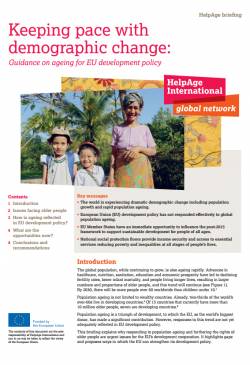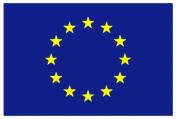 This week, in partnership with a number of our EU Affiliates, HelpAge launched a new policy brief called Keeping pace with demographic change – Guidance on ageing for EU development policy.
This week, in partnership with a number of our EU Affiliates, HelpAge launched a new policy brief called Keeping pace with demographic change – Guidance on ageing for EU development policy.
This brief will be used by HelpAge and our EU network to underline the importance of global ageing in EU development policy among key EU decision-makers and to draw their attention to our recommendations, particularly in relation to the post-2015 process.
An opportunity for the EU to address the gaps
The Millennium Development Goals (MDGs) have strongly guided EU development policy over the last 15 years.
However, the narrow, targeted nature of the MDGs has meant older people’s rights and broader demographic trends have been largely invisible in development responses, including at the EU level.
The ongoing process to develop a global framework to succeed the MDGs and drive sustainable development beyond 2015 is a huge opportunity for the EU as the world’s biggest donor of aid to address these gaps.
I have been working with Affiliates of the HelpAge EU network for the last three years to influence the EU’s policies on the post-2015 process. During this time we have:
- Inputted to the European Commission public consultation on post-2015 during 2012.
- Organised a meeting at the European Parliament with two prominent MEPs and older and younger Age Demands Action activists to discuss older people’s rights in EU development and the post-2015 process.
- Established strong relationships and regular communication with governments at national level around the post-2015 process.
- Participated in various initiatives and meetings of the Beyond 2015-CONCORD European Taskforce and associated national networks.
It has been encouraging therefore to see that the policy positions produced by the EU institutions so far have shown signs of an emerging recognition of the significance of ageing and population dynamics.
However, these references are still far from consistent and I fear that they are constantly at risk of falling off the EU agenda. The EU must also go further than words alone and ensure that an understanding of population dynamics, including ageing, underpins its analysis and policy development.
New EU policy-makers
A new European Parliament was elected earlier in 2014 and a recently-approved college of Commissioners is just starting work at the European Commission.
The HelpAge EU network has already been engaging actively with these incoming decision-makers. EU Member States are also currently developing Council Conclusions on the post-2015 process, which will be adopted in their Foreign Affairs Council meeting in December.
These Conclusions are important because they will act as the EU’s common position in the imminent UN intergovernmental negotiations, in which the EU is expected to play a strong role.
The time is now
Our policy brief and the complementary work of HelpAge’s network across the EU therefore comes at a critical moment.
We need to continue to work hard together to protect the recognition for ageing and older people’s rights that has already been secured.
We must also ensure that these issues are more systematically addressed as a priority in EU development policy, and firmly embedded in the EU post-2015 positions.
The Keeping pace with demographic change brief was funded by the European Union. It is also available for download in Czech.
The contents of the brief are the sole responsibility of HelpAge International and can in no way be taken to reflect the views of the European Union.

